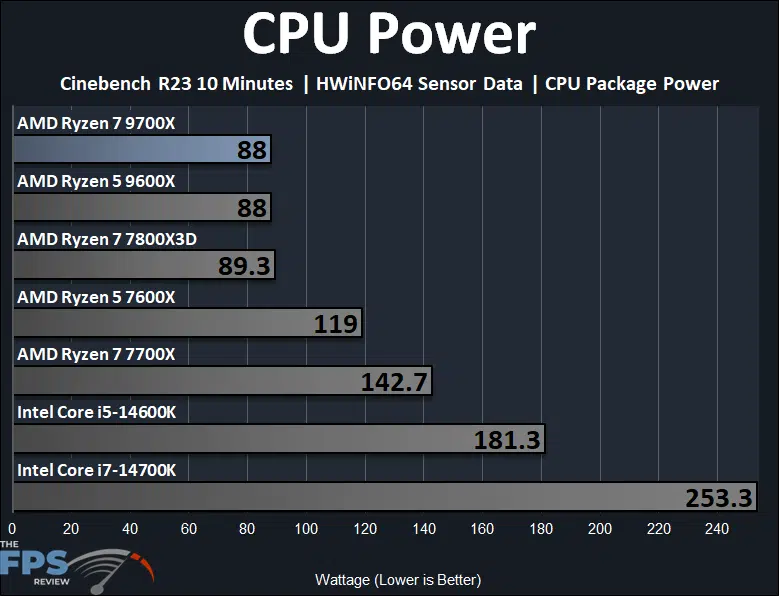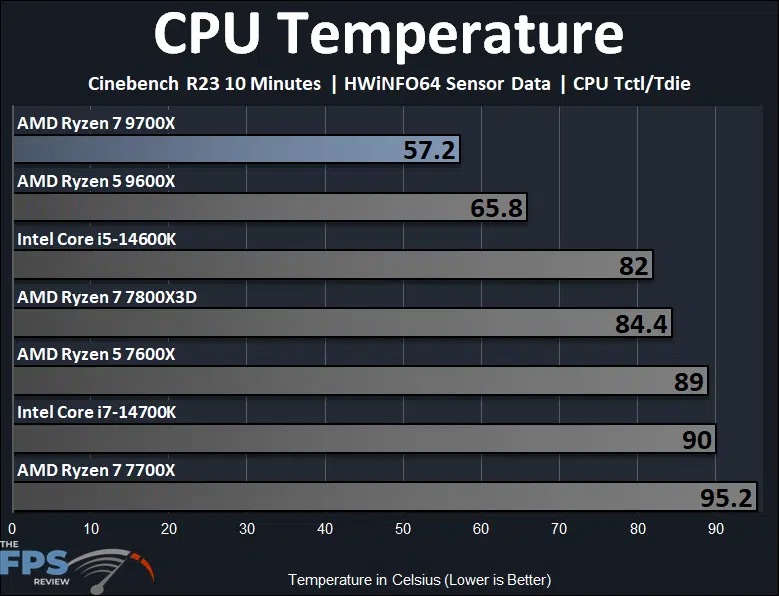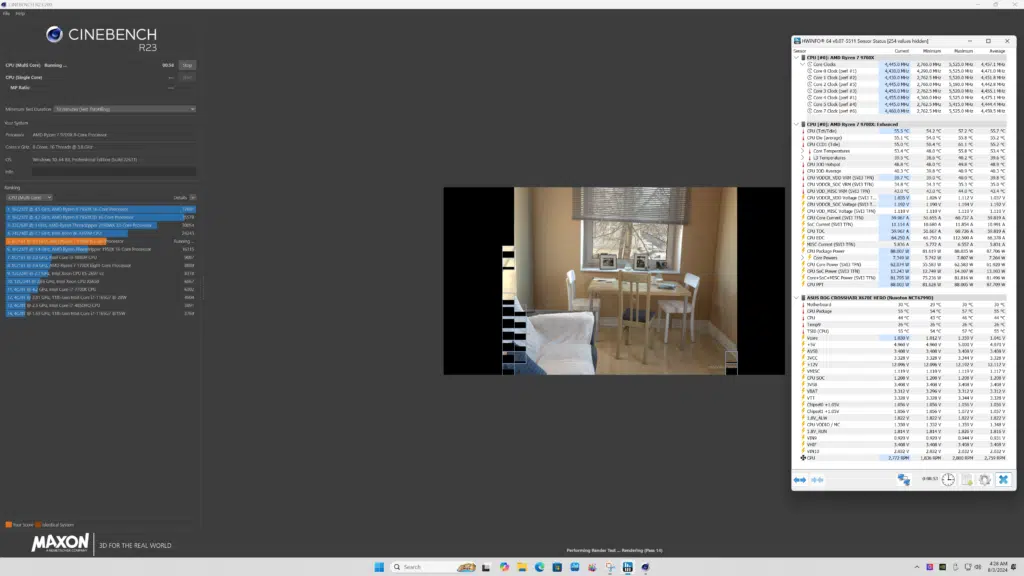Power Temperature and Frequency
On this page, we are going to investigate the AMD Ryzen 7 9700X power draw, temperature, and frequency. This is a stress test, which means we are pushing each CPU to its maximum potential in all-core load in the Cinebench R23 multi-core test for 10 minutes.
Power
We use HWiNFO64 sensor data to record the results. We report on the sensor data for “Package Power” in Wattage.

Honestly, this graph speaks for itself. The TDP of the new AMD Ryzen 7 9700X is 65W, but of course, TDP is not power draw, but rather the thermal capacity it is rated for. As we can see, in testing the Package Power the AMD Ryzen 7 9700X hits 88W at maximum Package Power Wattage. This is a whopping 38% lower power draw than the AMD Ryzen 7 7700X, that’s right, a 38% savings in power, yet more performance in our testing. Its power draw is equal to the Ryzen 7 7800X3D on all-core, full-load, which actually is a higher 120W TDP CPU.
If we compare this then to the competition, the AMD Ryzen 7 9700X draws 51% less power than the Intel Core i5-14600K and 65% less power than the Intel Core i7-14700K. Note that the Intel Core i7-14700K is locked at PL1/PL2 of 253W with this BIOS, and not unlocked or allowed to exceed that power, which it would if it were not locked to Intel Defaults.
Simply put, power efficiency is a key point of the AMD Ryzen 7 9700X, and Ryzen 5 9600X CPUs. It is real, and it is effective.
Temperature
We use HWiNFO64 sensor data to record the results. We report on the sensor data for “Tcidle” in Celsius.

Again, this graph speaks for itself. Note that the same AIO was used for all temperature testing, an MSI MEG Coreliquid S360 360mm AIO, which honestly is overkill for the new Ryzen 7 9700X and Ryzen 5 9600X. As we experienced above, the Package Power was only 88W.
The AMD Ryzen 7 9700X runs at a cool 57.2c temperature, and we triple-checked this, with different versions of HWiNFO64 as well, using the latest Beta available. We even reached out to AMD for a sanity check. AMD tells us this is expected behavior, and the reason is down to the all-core/full-load CPU frequency the CPU runs at. The AMD Ryzen 7 9700X has more cores spread out, that operate within the same power budget and therefore boost lower in clock frequency compared to the Ryzen 5 9600X, this accounts for the temperature differences. The Ryzen 5 9600X has fewer cores, and within this power budget runs at a faster frequency, thus heating up a bit more.
At this temperature of 57.2c, the AMD Ryzen 7 9700X is running 40% cooler than the AMD Ryzen 7 7700X. It is also 32% cooler than the Ryzen 7 7800X3D, 30% cooler than the Intel Core i5-14600K, and 13% cooler than the Ryzen 5 9600X.
Frequency

The AMD Ryzen 7 9700X has a base clock of 3.8GHz and a boost frequency of up to 5.5GHz. In our testing, we experienced the all-core/full-load hitting 4.4GHz on all cores, with some cores getting up to 4.45GHz or 4.5GHz at times briefly, and this is pushing all cores at once. In the single-core/single-thread testing, we found that the CPU would boost up to 5.525GHz on a single-core performance load, therefore it was boosting up to its rated frequency.
From this, we can see one reason why the temperatures are lower at all-core/full-load, the cores are running around 4.4GHz with all of them active. If we compare this, to say, the AMD Ryzen 7 7700X we found that the CPU runs at 5.175-5.2GHz on all cores active at once due to the higher power draw and allowed temperature. Therefore, the AMD Ryzen 9 9700X is running about 15% lower core frequencies on all-core/full-load with all cores active at once compared to the 7700X. Now, when you consider that it’s faster on performance than the Ryzen 7 7700X, this starts to look very impressive for the 9700X.
